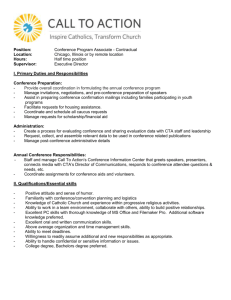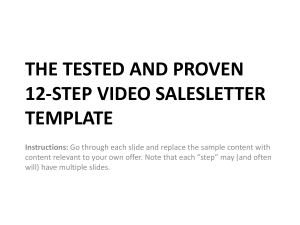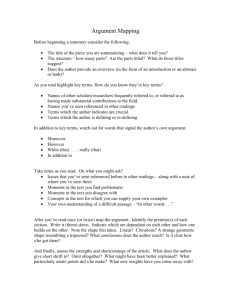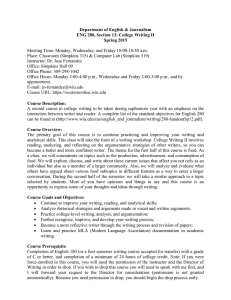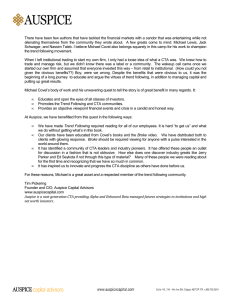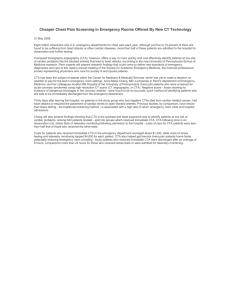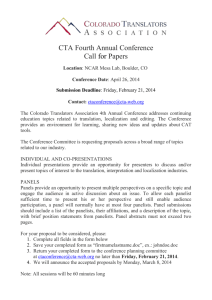Department of English & Journalism Fall 2014
advertisement
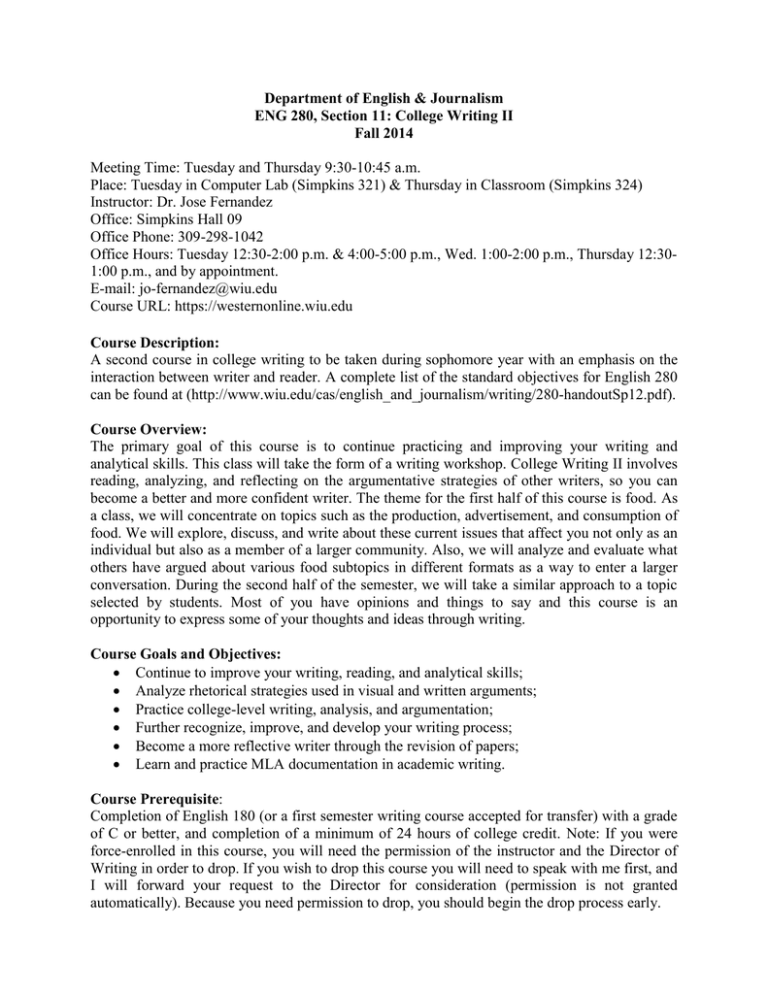
Department of English & Journalism ENG 280, Section 11: College Writing II Fall 2014 Meeting Time: Tuesday and Thursday 9:30-10:45 a.m. Place: Tuesday in Computer Lab (Simpkins 321) & Thursday in Classroom (Simpkins 324) Instructor: Dr. Jose Fernandez Office: Simpkins Hall 09 Office Phone: 309-298-1042 Office Hours: Tuesday 12:30-2:00 p.m. & 4:00-5:00 p.m., Wed. 1:00-2:00 p.m., Thursday 12:301:00 p.m., and by appointment. E-mail: jo-fernandez@wiu.edu Course URL: https://westernonline.wiu.edu Course Description: A second course in college writing to be taken during sophomore year with an emphasis on the interaction between writer and reader. A complete list of the standard objectives for English 280 can be found at (http://www.wiu.edu/cas/english_and_journalism/writing/280-handoutSp12.pdf). Course Overview: The primary goal of this course is to continue practicing and improving your writing and analytical skills. This class will take the form of a writing workshop. College Writing II involves reading, analyzing, and reflecting on the argumentative strategies of other writers, so you can become a better and more confident writer. The theme for the first half of this course is food. As a class, we will concentrate on topics such as the production, advertisement, and consumption of food. We will explore, discuss, and write about these current issues that affect you not only as an individual but also as a member of a larger community. Also, we will analyze and evaluate what others have argued about various food subtopics in different formats as a way to enter a larger conversation. During the second half of the semester, we will take a similar approach to a topic selected by students. Most of you have opinions and things to say and this course is an opportunity to express some of your thoughts and ideas through writing. Course Goals and Objectives: Continue to improve your writing, reading, and analytical skills; Analyze rhetorical strategies used in visual and written arguments; Practice college-level writing, analysis, and argumentation; Further recognize, improve, and develop your writing process; Become a more reflective writer through the revision of papers; Learn and practice MLA documentation in academic writing. Course Prerequisite: Completion of English 180 (or a first semester writing course accepted for transfer) with a grade of C or better, and completion of a minimum of 24 hours of college credit. Note: If you were force-enrolled in this course, you will need the permission of the instructor and the Director of Writing in order to drop. If you wish to drop this course you will need to speak with me first, and I will forward your request to the Director for consideration (permission is not granted automatically). Because you need permission to drop, you should begin the drop process early. Required Texts: Barnet, Sylvan and Hugo Bedau. From Critical Thinking to Argument. 4th. ed. Boston: Bedford/St. Martin’s, 2010. (ISBN: 9781457649950). Pollan, Michael. The Omnivore’s Dilemma: A Natural History of Four Meals. New York: Penguin, 2006. (ISBN: 9780143038580). Assignments and Evaluations: Class Participation & Activities Writing Exercises Visual Analysis & Presentation Interview Narrative Research Proposal & Annotated Bibliography Argument Paper & Presentation Total 150 points 200 points 100 points 150 points 150 points 250 points 1000 points Grading Scale: A = 930-1000; A- = 900-929; B+ = 860-899; B = 830-859; B- = 800-829; C+ = 760-799; C = 730-759; U (unsatisfactory) = 600-729; F = 599 or below. Short Breakdown of Assignments and Evaluations: Class Participation & Activities: Your active class participation will be necessary to fulfill the goals and objectives of the course. Class activities will include working individually or in groups on writing activities, discussions, short online posts, responses to posts, and short and extended presentations on a regular basis. Attend class prepared by reading the assigned material before class according to the schedule of readings. Students are required to bring their syllabus, textbooks, flash drive, and the appropriate material to each class. Writing Exercises: 10-12 short writing exercises worth 15-20 points each. Most writing exercises will ask you to answer questions, brainstorm or formulate ideas, or write reactions pieces based on the assigned readings. Other writing exercises will help you to brainstorm, prewrite, and draft sections of major writing assignments. The posts will be submitted electronically via WesternOnline before the beginning of class. LATE posts will be accepted, but you will lose five points for each class the post is late. INCOMPLETE posts will not receive full credit. Visual Analysis & Presentation: Students will analyze and write an argument (9001200 words) about a TV advertisement related to food using visual evidence. Students will present their work in a short group presentation. Interview Narrative: You will conduct a field interview with a food or nutrition “expert” and write about your findings and experience in a paper (900-1200 words) that will combine parts of your interview with a detailed description of the interview. Research Proposal and Annotated Bibliography: In this paper (1200-1500 words), you will select a subtopic to write your final term paper (the “Argument Paper”). The proposal will also include an explanation for selecting your subtopic, a draft thesis statement, and an annotated list of the sources you plan to use in the next Argument Paper. Argument Paper & Presentation: A research-based paper (2100-2400 words) based on your Research Proposal and Annotated Bibliography. Students will present their arguments and findings during a presentation at the end of the semester. Note: students must receive a passing grade on the Argument Paper in order to pass the class. General Guidelines for Paper Submissions: I will post an instructions sheet with an evaluation criteria on WesternOnline for each of the four major papers. All your draft and revised papers will be submitted electronically as a Microsoft Word document in the “dropbox” section of WesternOnline before the beginning of class when the paper is due (see schedule of writing assignments). Late papers will be accepted, but you will lose 15 points for each class the paper is late. For specific formatting details and requirements for all four writing assignments, read the “Format for Writing Assignments” sheet posted on WesternOnline. You will get feedback on most draft papers before you receive a paper’s final grade. Make sure to SAVE all your work on your computer or a flash drive. Computer issues are not an excuse for submitting incomplete or late work. Attendance Policy: Since this course will rely on students’ active participation through writing activities, group work, and class discussions, attendance and punctuality are required. If you miss class due to illness, personal emergency, or any other reason, notify me via email before or after an absence occurs. You may have THREE excused or unexcused absences without penalty, but you are still responsible for meeting the assignments’ deadlines (students will NOT be able to make up for missing class work). Beginning with your fourth absence, you will lose 15 points from your class participation grade for each subsequent absence. Habitual tardiness may negatively affect your grade as well. Keep in mind that if you accumulate more than seven absences, you will NOT receive a passing grade in this course. Outside Class Communication: The best way to reach me outside class is by email. I will respond to your emails promptly (within 48 hours). You are also responsible for checking your WIU email account and WesternOnline on a regular basis. Please feel free to stop by any time during my office hours or email me to make an appointment outside office hours to discuss any aspect of the course such as your writing, a particular grade, or your overall performance in this course. Think about office hours as a time when I will be available to work with you individually on any of the class assignments. Individual Conferences: We will have two individual conferences during the semester where we will discuss and work on your draft papers that will be submitted in the “dropbox” section of WesternOnline before our meeting. Attending your conference will be part of the paper’s final grade and missing your conference will also count as an absence. Note: if you visit me during office hours or arrange an individual conference while finding sources or writing your Research Proposal and Annotated Bibliography, you will receive five extra credit points. Classroom Etiquette: Students should turn off all their electronic devices before the beginning of class and should not be engaged in any other activity that is not related to the class. Please do not leave the classroom abruptly; if you need to excuse yourself for an important reason while the class is in session, please let me know in advance. Similarly, when working on the computer lab or small groups, students are expected to work on the assigned task. You are also expected to show civility and respect for other students’ ideas, opinions, and beliefs expressed in writing or during class discussion. You may receive a warning if you do not comply with these expectations, but any time you engage in any of these behaviors, it will automatically affect your class participation grade (with or without a warning). Academic Integrity and Plagiarism: Plagiarism occurs when students present a short or long piece of a work that was created by another individual or was taken from a source without properly acknowledging it. Plagiarism is a serious offense. If you plagiarize any section of a formal assignment during this course, it may result in failure of the assignment and failure of the entire course. If you have any questions about what constitutes plagiarism, ask me or read the Western Illinois University’s Student Academic Integrity Policy (http://www.wiu.edu/vpas/policies/acintegrity.php). University Writing Center The University Writing Center is available to assist you with general and specific questions on writing assigned in any discipline and at any academic level. The one-on-one assistance available at the Writing Center is valuable for generating ideas, talking about global-level issues such as organization, and even working through grammatical problems. The University Writing Center is located at the Malpass Library, 3rd Floor, West Side. For more information, visit the University Writing Center website (http://www.wiu.edu/university_writing_center/). Student Rights and Responsibilities A complete list of your rights and responsibilities as a Western Illinois University student is available at (http://www.wiu.edu/provost/students.php). Accommodations: “In accordance with University policy and the Americans with Disabilities Act (ADA), academic accommodations may be made for any student who notifies the instructor of the need for an accommodation. For the instructor to provide the proper accommodation(s) you must obtain documentation of the need for an accommodation through Disability Support Services and provide it to the instructor. It is imperative that you take the initiative to bring such needs to the instructor’s attention, as he/she is not legally permitted to inquire about such particular needs of students. Students who may require special assistance in emergency evacuations (i.e. fire, tornado, etc.) should contact the instructor as to the most appropriate procedures to follow in such an emergency. Contact Disability Support Services at 298-2512 for additional services.” Source: Official University Policy Manual (http://www.wiu.edu/policies/syllabus.php). Important Dates: Friday, August 29: Last day of open registration. Monday, Sept. 8: Last day of restricted registration. Sunday, Nov. 2: Last day to drop course and last day for a total university withdrawal. Schedule of Activities, Readings, and Assignments: This schedule is subject to change. If any of this information changes, I will inform you during class and post an updated version on WesternOnline. Abbreviations: WO = WesternOnline CTA = From Critical Thinking to Argument Lab = Simpkins 321 & Class = Simpkins 324 Important Note: Unless changes are announced, readings, writing exercises, draft papers, and final papers are due by the date marked in the left column, and ALL writing assignments should be posted or uploaded electronically on WesternOnline (WO) before class. Wk 1 2 3 4 5 6 7 8 Date & Place ……. T, Aug. 26 Lab Th., Aug. 28 Class T, Sept. 2 Lab Th., Sept. 4 Class T, Sept. 9 Lab Th., Sept. 11 Class T, Sept. 16 Lab Th., Sept. 18 Class T, Sept. 23 Lab Class Topic & Readings Due before Class Introductions & Academic Interests Course Overview, Goals, and Objectives Topic: Argumentation & Rhetorical Appeals (Ethos, Logos, & Pathos) Read: CTA 70-73 & 96-108 (Ethos, Logos, & Pathos) Topic: Visual Rhetoric Read: CTA 117-135 (Visual Rhetoric) Topic: Audience Read: CTA 179-184 Read: CTA 135 (Checklist for Analyzing Ads) Read: Omnivore’s Dilemma (Intro; Chapters 1 & 2) Visual Analysis Workshop Read: CTA 155 (Checklist for Analyzing a Text) Visual Analysis Presentations Writing Exercises & Papers Due before Class Syllabus Questionnaire Due Writing Exercise 1Due (Reaction to a Food TV Ad) Writing Exercise 2 Due (Analysis of a Food TV Ad) Writing Exercise 3 Due (Pollan & Ways of Thinking about Food) Draft Visual Analysis Due Visual Analysis Due Topic: Critical Thinking & Asking Questions Read: CTA 3-23 (Critical Thinking) Read: Omnivore’s Dilemma (Chapters 4 & 6) Writing Exercise 4 Due (Pollan’s Mixing Narrative & Interviews) Th., Sept. 25 Class Read: CTA 224-226 (Interviewing Experts) Read: Omnivore’s Dilemma (Chapters 7 & 8) Writing Exercise 5 Due (Pollan and Critical Thinking) T, Sept. 30 Lab Read: Articles posted on WO under “Readings Folder” Read: Omnivore’s Dilemma (Chapters 9 & 10) Read: Omnivore’s Dilemma (Chapters 12 & 14) Writing Exercise 6 Due (Draft Questions for Field Interview) Th., Oct. 2 Class M-F Oct. 6-10 T, Oct. 14 Lab Th., Oct. 16 Class No Classes: Individual Conferences Read: Omnivore’s Dilemma (Chapters 15 & 17) Writing Exercise 7 Due (Pollan on Grass Fed Animals) Interview Transcripts & Draft Narrative Due before Conference Writing Exercise 8 Due (“The Ethics of Eating Animals”) Interview Narrative Due 9 T, Oct. 21 Lab Th., Oct. 23 Class 10 T, Oct. 28 Lab Th., Oct. 30 Class 11 12 T, Nov. 4 Lab Th., Nov. 6 Class T, Nov. 11 Lab Th., Nov. 13 13 T, Nov. 18 Lab Th., Nov. 20 Class 14 15 16 17 Topic: Selecting a Subtopic for Research Proposal Read: Omnivore’s Dilemma (Chapters 18 & 20) Topic: Finding & Evaluating Sources Read: CTA: 214-232 (Finding and Evaluating Sources) Read: CTA 231 (Checklist for Evaluating Online Sources) Topic: Drafting a Thesis Statement Read: CTA: 178-179 (Writing a Thesis Statement) Topic: Summarizing Sources Read: CTA 45-54 (Writing Summaries) Topic: Writing an Annotated Bibliography Read: CTA 236-237 (Annotated Bibliography) Topic: MLA Documentation Read: CTA: 253-266 (MLA Documentation) Topic: From Research Proposal to Argument Paper Topic: Analyzing and Responding to Arguments Read: CTA: 147-155 (Analyzing an Argument) Read: Articles posted on WO under “Readings Folder” Topic: Use of Quotations & In-Text Citations Following MLA Format Read: CTA: 241-253 (Quoting from Sources Using MLA Documentation) No Class: Work on Writing Exercise 11 Read: Articles posted on WO under “Readings Folder” Topic: Writing an Outline Read: CTA 194-197 (Writing an Outline) Read: CTA 273-280 (Sample MLA Paper) Read: CTA 232-236 (Note on Plagiarism) Read: Articles posted on WO under “Readings Folder” M-F Nov. 24-28 M-F Dec. 1-5 No Classes: Thanksgiving Break T, Dec. 9 Lab Argument Paper Workshop Read: CTA 205 (Checklist for Draft Argument) Read: CTA 271 (Checklist for Argument Paper) Class Evaluations Th., Dec. 11 Class Th., Dec. 18 Class No Classes: Individual Conferences Argument Paper Presentations Starting at 8:00 a.m. Writing Exercise 9 Due (Pollan & “The Perfect Meal”) Writing Exercise 10 Due (Subtopic, Draft Thesis Statement, and Four Sources) Research Proposal & Annotated Bibliography Due Writing Exercise 11 Due (Responding to an Argument) Writing Exercise 12 Due (Taking a Position among Competing Views) Draft Outline, Revised Thesis Statement, & Draft Argument Paper (3+ Pages) Due Draft Argument Paper (4+ pages) & Draft Works Cited Page Due Outline & Argument Paper Due
